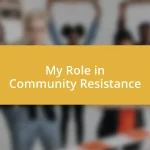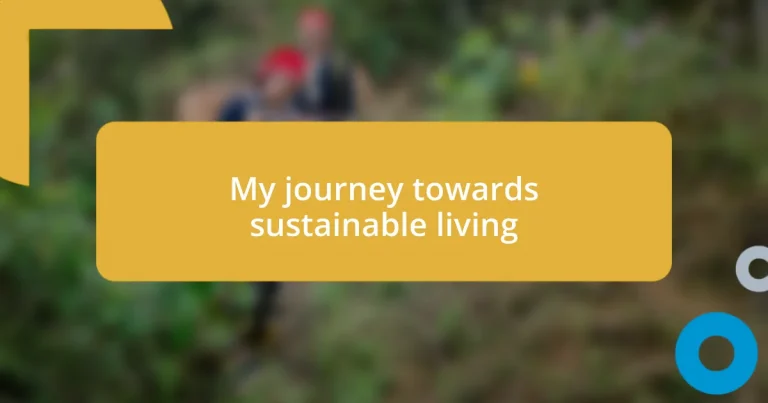Key takeaways:
- Sustainable living involves conscious choices to reduce waste and minimize environmental impact, such as using reusable bags and cycling for transportation.
- Identifying personal sustainability goals is essential; evaluating habits, setting specific intentions, and connecting with the community can inspire meaningful changes.
- Incorporating sustainable practices at home, like composting and using natural cleaning products, can drastically improve both personal well-being and environmental health.
- Engaging with local sustainability communities fosters motivation and camaraderie, enhancing the overall journey toward a more sustainable lifestyle.
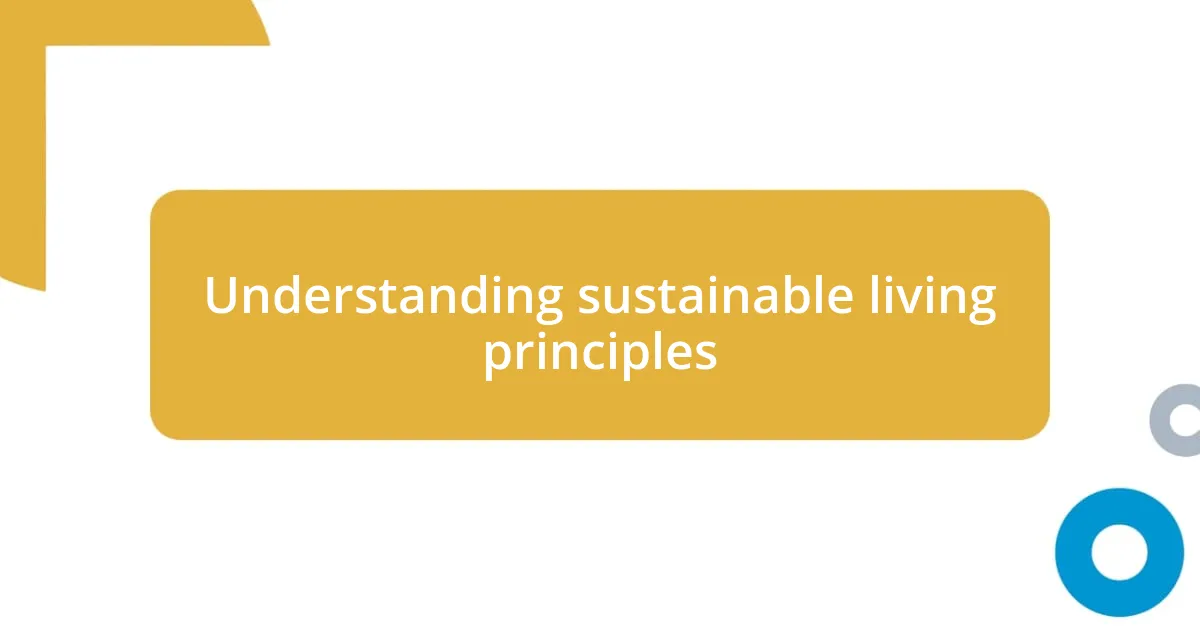
Understanding sustainable living principles
Sustainable living revolves around making choices that minimize our impact on the planet. I remember the first time I took a hard look at my daily habits; it was eye-opening to realize how much waste I was generating. Have you ever counted how many single-use items you toss out each week? It’s staggering!
At its core, sustainable living encourages us to think carefully about our consumption patterns. When I began to prioritize buying local produce, I found not only fresher flavors but also a deeper connection to my community. These small shifts can ripple outward, inspiring others to consider their choices as well.
One fundamental principle is reducing our carbon footprint by embracing alternative transportation methods. I made a personal commitment to cycling to work several times a week, and the environment wasn’t the only beneficiary—I felt healthier and more energized. It begs the question: what changes can you make in your life to move closer to sustainable living?
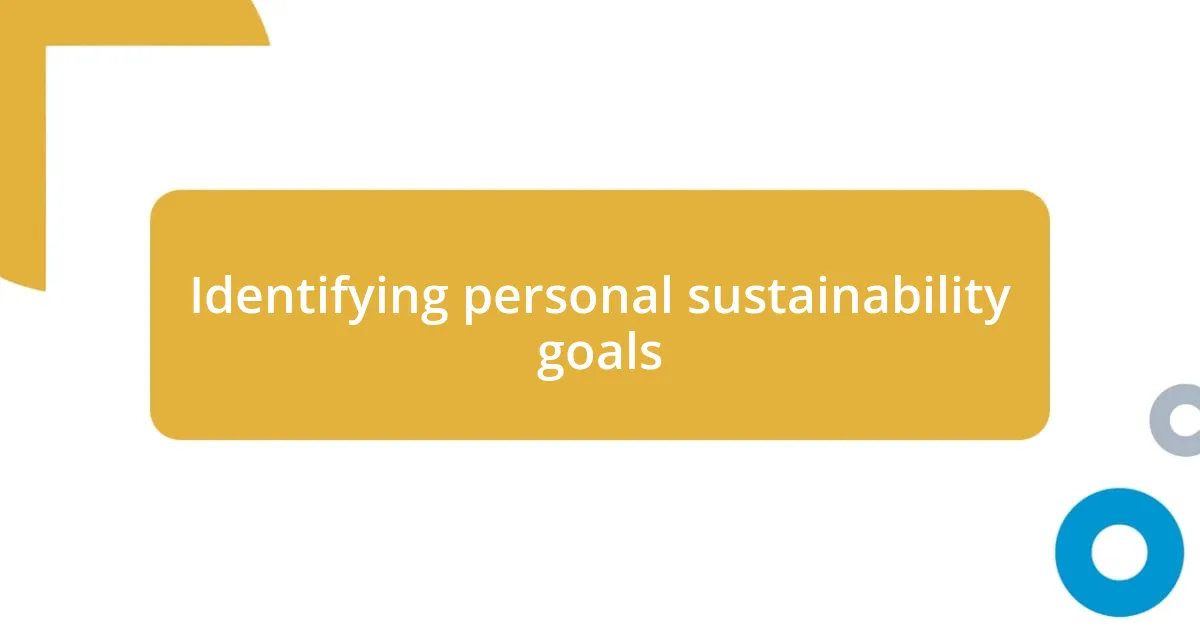
Identifying personal sustainability goals
Identifying personal sustainability goals is a deeply personal journey. It starts with reflecting on what aspects of your lifestyle resonate most with you. I remember sitting in my favorite coffee shop, sipping an organic brew while jotting down my aspirations. I realized that my goals should reflect my values and what I’m passionate about—like reducing waste or supporting ethical brands.
Here are some steps to help clarify your sustainability goals:
- Evaluate habits: Take note of your daily activities and identify areas where you can reduce waste or energy consumption.
- Set specific intentions: Focus on designing a measurable goal, like limiting fast fashion purchases or incorporating a plant-based meal into your weekly routine.
- Connect with community: Engage with local groups focused on sustainability—sometimes, their excitement can inspire your own commitments.
- Reflect regularly: Set aside time each month to assess your progress and adjust your goals as necessary, keeping in tune with your evolving journey.
By diving into the specifics that matter to me, I found clarity and motivation. Each goal I set became a small victory, fueling my desire to keep pushing for sustainability in every area of my life.
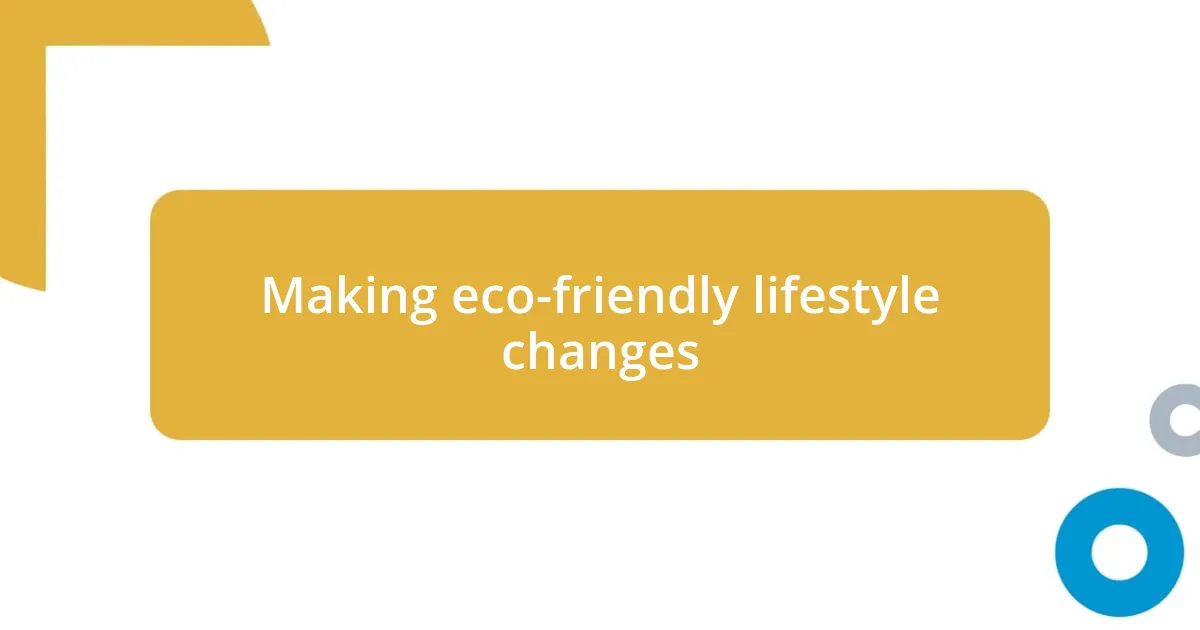
Making eco-friendly lifestyle changes
Making eco-friendly lifestyle changes can feel overwhelming at times, but I’ve found that small, intentional adjustments can make a big difference. For instance, I swapped out plastic bags for reusable ones, and each time I do my grocery shopping, it gives me a sense of purpose. It became a simple yet powerful reminder that my choices matter—not just for me, but for future generations. Have you tried replacing any single-use products with reusable alternatives?
Cooking at home instead of dining out has transformed my relationship with food and waste. Initially, I was hesitant because I thought it would take too much time. However, as I began experimenting with recipes and using leftover ingredients, I realized how much waste I was eliminating. Plus, cooking has become a delightful hobby that brings joy to my day. What hidden passions might you discover by changing your eating habits?
Switching to energy-efficient appliances is another significant change I embraced. When I replaced my old fridge with a more eco-friendly model, I was astonished by how much energy it saved. Not only did my electricity bill drop, but the satisfaction of knowing that I was reducing my household’s carbon footprint was incredibly fulfilling. Is there an appliance in your home that could be upgraded for better efficiency?
| Eco-Friendly Change | Impact |
|---|---|
| Reusable Bags | Reduces plastic waste and encourages mindful shopping |
| Home Cooking | Minimizes food waste and can enhance culinary skills |
| Energy-Efficient Appliances | Lowers energy consumption and costs while benefiting the environment |
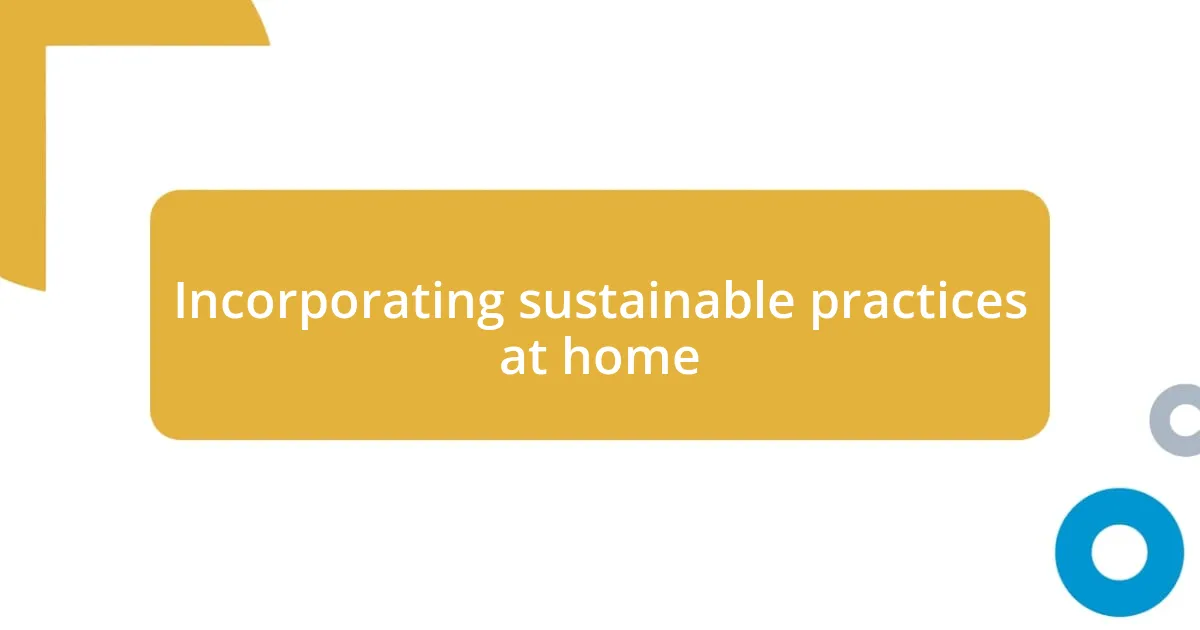
Incorporating sustainable practices at home
Incorporating sustainable practices at home doesn’t have to be a monumental task; I’ve found that simple adjustments can significantly impact both my daily life and the environment. For example, I started composting kitchen scraps a few months ago. Initially hesitant, I soon discovered the satisfaction of enriching my garden soil while reducing waste. Have you considered what could become compost in your kitchen?
I also embraced the idea of minimalism. Each time I decluttered a room, I became more aware of how much unnecessary stuff had accumulated over the years. It was liberating to donate or recycle items I no longer used. Not only did it clear physical space, but it also created a mental shift towards valuing experiences over possessions. Could letting go of things you don’t need help you focus on what truly matters?
Utilizing natural cleaning products has been another gratifying change. I traded chemical-laden cleaners for DIY solutions using vinegar and baking soda. This switch not only reduced toxins in my home but also saved money. It’s fascinating how something so simple transformed my cleaning routine into a mindful practice. What natural alternatives might you explore in your own home?
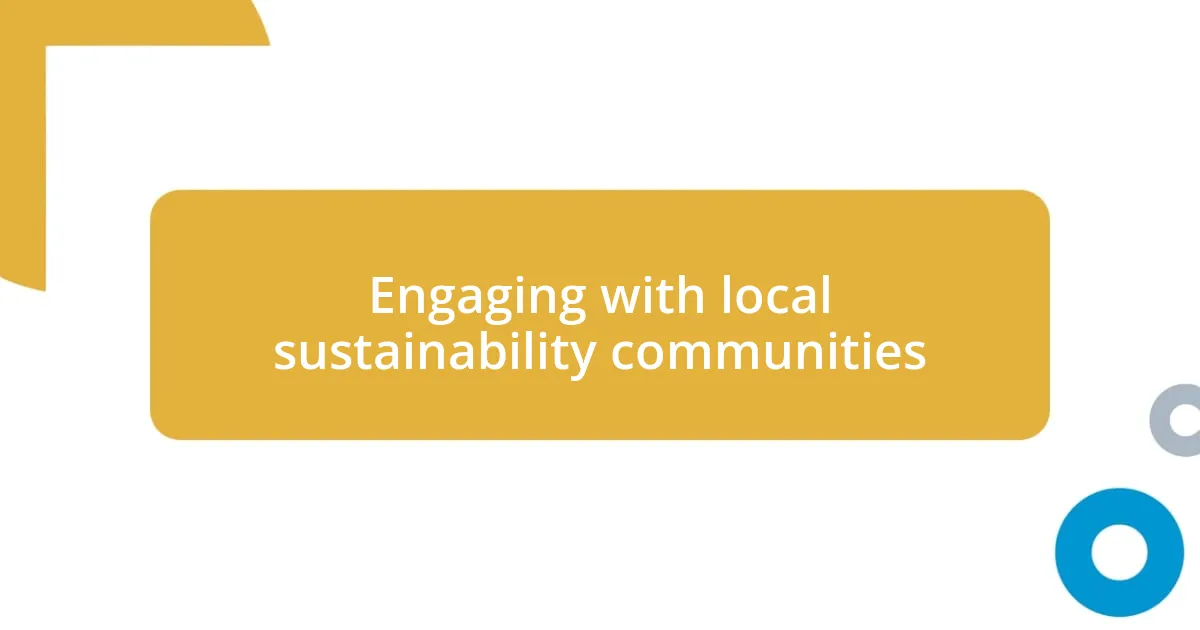
Engaging with local sustainability communities
Connecting with local sustainability communities has truly enriched my journey. When I attended a meet-up hosted by a local environmental group, I was surprised by how welcoming everyone was. Sharing stories and tips with like-minded individuals not only inspired me but also made me feel part of something bigger. Have you ever experienced a moment where you realized how many people are on the same path as you?
I also started volunteering for community clean-up days, and the experience was eye-opening. Not only did I get to enjoy the outdoors, but I also witnessed firsthand the impact a small group can have on local spaces. Seeing a once littered park transformed into a pristine area fueled my motivation and fostered a sense of camaraderie among participants. Engaging in these activities made me consider: what role can you play in improving your community?
Moreover, participating in local farmers’ markets became one of my favorite weekend rituals. Buying fresh produce directly from growers not only supports local economies but also ensures that I’m eating seasonal and sustainable foods. Plus, chatting with the farmers about their practices deepened my appreciation for where my food comes from. Have you thought about how your food choices can influence your community and the environment?
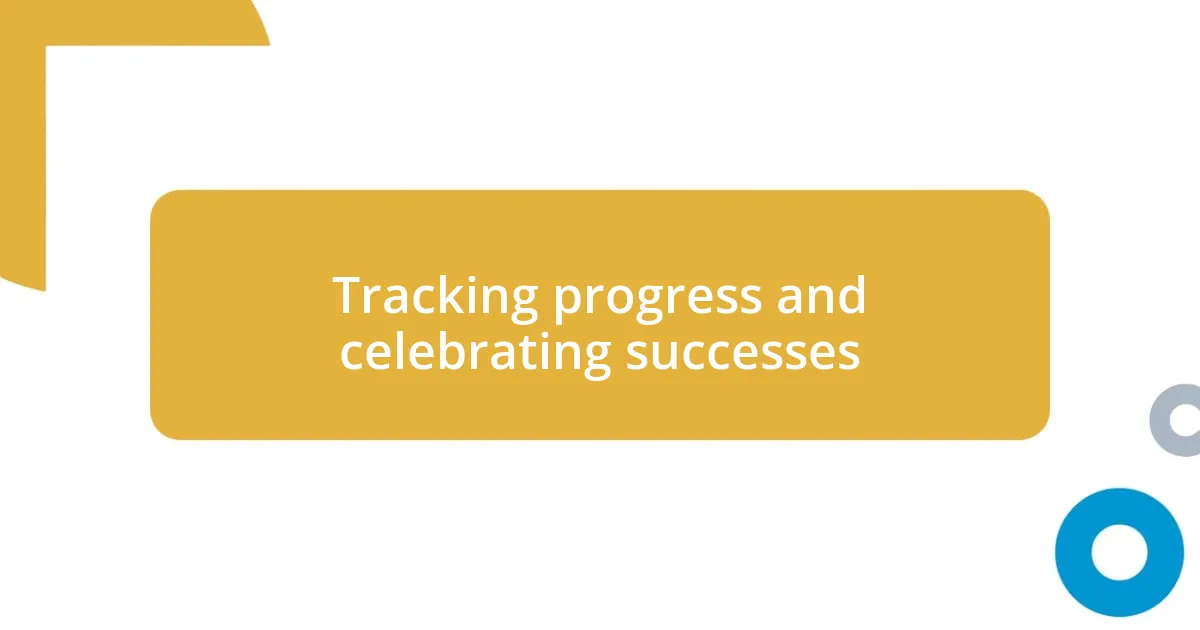
Tracking progress and celebrating successes
Tracking my progress has become a crucial part of my sustainable living journey, and I did this through a journal where I noted both small and significant changes I made over time. Each entry brought a sense of accomplishment, whether it was a successful swap to reusable bags or finally remembering to take my own container to the bulk store. These entries serve as a reminder of how far I’ve come, pushing me forward and motivating me to set new goals. How do you keep track of your sustainability efforts?
Celebrating successes can feel almost as rewarding as the changes themselves. I recall when I hit my goal of zero food waste for an entire month; I treated myself to a carefully curated plant for my home. It wasn’t just about the plant; it represented my commitment to reducing waste and making meaningful choices. How do you reward yourself for the milestones you achieve?
I believe that sharing successes with others amplifies the joy of the journey. I started a small online group with friends where we share our wins, whether big or small. It’s fascinating how a simple post about a successful DIY project or a newfound recipe can spark encouragement and inspire others to take their own steps toward sustainability. Have you considered how your story might uplift those around you?






